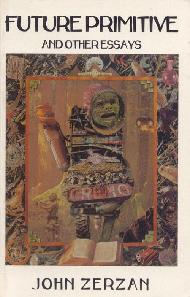 | |
| Author | John Zerzan |
|---|---|
| Subject | Anarcho-primitivism |
| Genre | Anthropology, political economy |
| Publisher | Autonomedia, Anarchy: a Journal of Desire Armed |
Publication date | December 1, 1994 |
| Publication place | United States |
| Media type | Paperback |
| Pages | 192 pages |
| ISBN | 1-57027-000-7 |
| OCLC | 30630861 |
| Preceded by | Elements of Refusal |
| Followed by | Running on Emptiness |
Future Primitive and Other Essays is a collection of essays by anarcho-primitivist philosopher John Zerzan published by Autonomedia in 1994. The book became the subject of increasing interest after Zerzan and his beliefs rose to fame in the aftermath of the trial of fellow thinker Theodore Kaczynski and the 1999 anti-WTO protests in Seattle. [1] It was republished in 1996 by Semiotext(e), and has since been translated into French (1998), Turkish (2000), Spanish (2001), and Catalan (2002). As is the case with Zerzan's previous collection of essays, Elements of Refusal , Future Primitive is regarded by Anarcho-Primitivists and technophobes as an underground classic. [2]